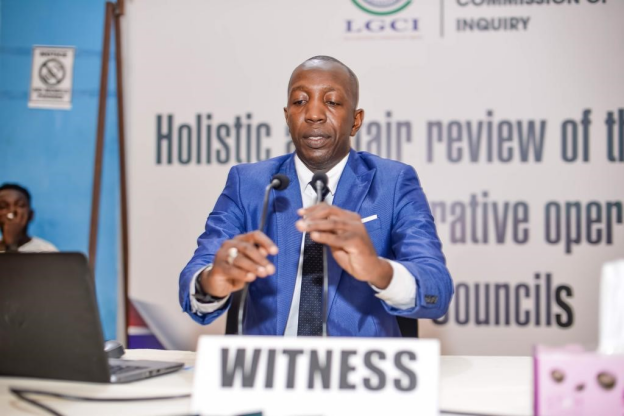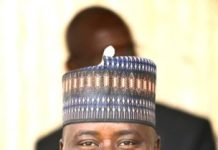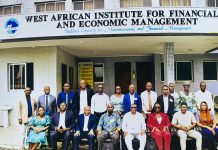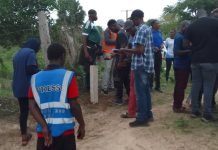By Makutu Manneh
Lamin Suso, the former Finance Director of Basse Area Council, has confirmed to members of the Local Government Commission of Inquiry that their council took loans from individuals without following due procedure.
He said the procedure requires the council to prepare a loan document that should be sent to the general council and the local government ministry respectively, for approval. When asked why Basse Area Council was not following due process, Suso replied that they would not get what they wanted if due process was followed.
“So, is it normal for the council to take loans from individuals and repay them when they have the money?” Counsel Gomez asked the witness who answered in the affirmative, adding that the practice has been going on at the Council.
He further informed the Commissioner that he used to give loans to the Basse Area Council so that they will be able to pre-finance Council’s activities. He explained that he once gave the council a loan of five hundred and seventy thousand Dalasi (D570,000) for the payment of a ‘1 by 6’ salary. When asked where he got the money from, Suso said he got it from his friends and family members.
Asked to mention the amount of money he received from each of his friends or family members, he stated the amount but it did not match with the amount he purportedly loaned the council.
“The math did not add up,” Lawyer Patrick Gomez told the witness.
“It is not that the whole money was meant for the payment of ‘1 by 6,” the witness replied.
Counsel Gomez interjected and told him not to change what he initially said because he (the witness) knew the math did not add up, adding that requesting monies from his friends and family was personal as he did not tell them the money was to pre-finance the Council’s activities.
“You were trying to act smart saying the money was for the payment of ‘1 by 6’, you think we will not get you? Are you maintaining that the money was for 1 by 6?” Patrick Gomez asked.
Suso replied in the positive and maintained that the monies were for ‘1 by 6’. However, when asked to do the calculations based on the account statement, Suso did the calculation, but the money still did not add up.
Counsel Gomez told him that the money was not meant for ‘1 by 6’ as he earlier argued and the witness agreed.
Asked how much was spent on the ‘1 by 6’, the witness said unless he goes back to the records, he cannot ascertain.
“Where did you derive the authority to give Council loan?” Commission Chairperson Jainaba Bah asked the witness.
In his response, the witness said he is not allowed by the financial manual to give loan to the council, but he “did it in good faith”, adding: “I used my discretion.”
When asked about Ndabah Krubally’s testimony that he only withdrew the money from Suso’s Alatentu Account, but he did not know its purpose, witness Suso said Krubally’s testimony was not true because he knew the purpose of the withdrawal.
On the issue of the Council evolving from the manual revenue collection system to using the digital revenue collection system, Suso admitted using the old system with GTRs, adding that in June and July 2021, some of the revenue collectors used the manual system of revenue collection.
Asked how much was collected using GTRs, he replied that he could not tell, but that it was recorded.
The auditors noted that the GTR collectors collected revenue below the approved tariffs of the council and incurred losses. Lamin Suso insisted that the GTR is an official council receipt.
“We want to know how much you have exactly collected, and where are the documents?” Lawyer Gomez asked. Counsel Gomez further told him that the Commission took note that the GTR receipts were used in June and July, and at the same time, there were huge deposits made into the Alatentu Agency business account belonging to the witness. He told him that these were the amounts deposited in Dalasi currency in the following sum for June: D45,000; D80,000; D119,000; D10,920; D7,500; D65,000; D355,000; D20, 000 and D200,000.
Lamin Suso tendered the following documents in evidence; the itemized commitment and expenditure report for 2021 and 2022 from the IFMIS System, cashbook reports for 2021 and 2022; recurrent expenditure for 2021 and 2022, development expenditure for 2021 and 2022, budget note for 2022; his (Lamin Suso’s) GT Bank’s savings and current account statements as well as vouchers for the 3.3 million Dalasi withdrawals he made from the different council accounts.
Lamin Suso tendered over one hundred vouchers to justify the expenditures of the monies he personally withdrew from the different accounts of the Basse Area Council.
“Looking at all these vouchers, I do not think the requirements are met. Considering the regulations, they [the vouchers] are all zero,” Lamin Suso said.
In their report, the auditors said Lamin Suso alone withdrew an amount of 4.1 Million Dalasi, but the witness said the auditors erred because he only withdrew 3.3 Million Dalasi. However, the vouchers that Suso tendered were supposedly meant to explain when, where, and how the monies he withdrew were spent.
One of the documents attached to the vouchers was a handwritten document regarding two hundred and seventy thousand Dalasi (D270,000) withdrawal made from Vista Bank. The law requires that all vouchers be accompanied by supporting documents including receipt of payment; necessary GPPA forms; purchase orders; invoices; goods receipt notes and others. The financial manual states that the Director of Finance is responsible for the control of expenditures and liable for unauthorized expenditures.
The Commission took time to look into each of the vouchers, but serious defects were detected in the vouchers rendering them worthless. Some of the defects were the missing signatures of the Chief Executive Officer (CEO) and the people, who prepared the overwhelming majority of the vouchers, and there were no requisitions; no invoices; and no receipt of payments, and the procurement officer did not sign the vouchers.
During the engagement with the counsel, Lamin Suso kept on answering “No”, anytime Lawyer Patrick Gomez asked the question: “Will this voucher be correct?’’
“Were you authorised to prepare vouchers?” Lawyer Patrick Gomez asked the witness.
“No, I am not,” Lamin Suso said, and admitted that he does not have the mandate to prepare vouchers which he said is the responsibility of the accounts clerks.
The witness said some of the vouchers were prepared by Momodou Lamin Carew, but his signature did not appear on the vouchers. He added that some of the vouchers were prepared by Ndabah Krubally, but his name and signature were missing while submitting he could identify their handwriting.
Each time they opened a voucher to evaluate, Lamin Suso would say the following: “The rules were not followed.”
Chairperson Jainaba Bah asked the witness why the columns in the vouchers were not completely filled and why essential information was missing. The witness admitted that this was wrong.
“You did that to avoid accountability because if you fill the vouchers and input the information, someone can trace it and know what happened,” Commission Chairperson Bah interjected.
“Yes,” Lamin Suso agreed.
“Is there any of your vouchers that complied with the regulations?” Lawyer Patrick Gomez asked the witness.
“No,” Lamin Suso replied.
“So, we should not rely on any of them,” Lawyer Gomez asked.
“Yes,” Lamin Suso answered.
“So, for all the vouchers you have there is no evidence of payment,” Lawyer Patrick Gomez asked.
“Yes,” Lamin Suso answered.
Lawyer Patrick Gomez listed the supporting documents for vouchers as required by law and the witness admitted that the Finance Unit of the Basse Area Council used to bypass the Internal Auditor who is mandated to give approval for payments and procurement activities among others.
“We cannot rely on the entire documents because none of them can be authenticated,” Lawyer Patrick Gomez said.
“Yes,” Lamin Suso replied in agreement with the lawyer.
On Ndabah Krubally, the witness said he is not a council member, but was paid allowances equal to the councilors. He said Malafi Badjie was also paid allowances.
“They do not attend meetings, but they are paid,” Lamin Suso said.
Lead Counsel, Lawyer Yakarr Cox interjected and asked Lamin Suso questions.
“Why will the general council invite a staff of the accounts unit when you as the head of the unit were there?” Yakarr Cox asked.
“It happens at times,” Lamin Suso said.
“Why?” Lawyer Yakarr Cox asked.
“They [the council] used their discretion to invite them,” Lamin Suso answered.
“What issues can your subordinates provide the council that you as the head cannot provide them? What value do your subordinates add to council meetings?” Lawyer Yakarr Cox asked.
“To me, there is no value,” Suso said.
The Lawyer said the general council indicated twenty people were supposed to be paid allowances and nine extra people were added.
Lamin Suso paid himself allowances without following due process. On the 23rd of August 2021, he paid himself seven thousand, five hundred Dalasi (D7,500) for five nights. Lamin Suso said his night allowance was one thousand, five hundred Dalasi (D1,500), and the voucher was raised by OusainouTouray, but he did not sign it, adding the CEO did not sign both the manual voucher and IFMIS voucher.
“The payment was not authorized by the CEO and it did not follow due process,” Lawyer Patrick Gomez said.
“Yes,” Lamin Suso said.
“Why did you pay yourself when the CEO did not authorise it?” Lawyer Gomez asked.
“That was not correct,” the witness answered.
“Therefore, we cannot rely on it,” Gomez said.
“Yes,” Lamin Suso answered.
Another voucher was also in relation to a night allowance for Lamin Suso for three nights withdrawn in January 2023. The purpose was for invitation to IFMIS meeting. The voucher was discarded because the date on the voucher and the date of the withdrawal were in different years.
Lamin Suso said fifty thousand Dalasi (D50,000) was paid to former Chairperson Foday Danjo as per diem for his visit to Chicago in the USA. The Commission noted that there were no supporting documents for the vouchers.
“Who authorised the payment?” Lawyer Patrick Gomez asked.
“There is no authorisation,” Lamin Suso said.
The witness said the voucher should be discarded because it does not have supporting documents. The rest of the vouchers were not complete. The witness asked for the vouchers to be discarded because the necessary documentations were missing.





















